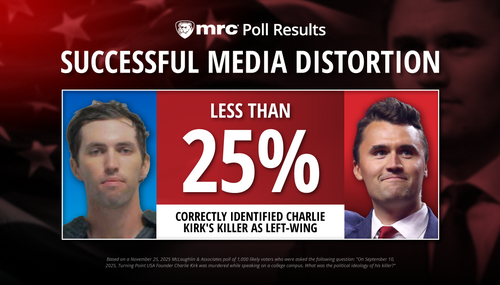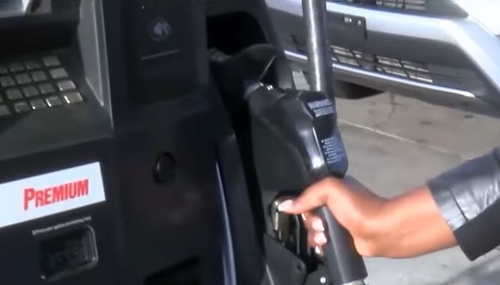 Tuesday's All Things Considered on NPR played up the long-term effect of the anti-ObamaCare "death panel" talking point and labeled this phrase "fake news." Don Gonyea let President Obama; Anita Dunn, his former communications director; and a talking head from the left-wing Center for American Progress decry the "dishonest" message from ObamaCare opponents and lament the "lasting negative effect" of the "early disinformation campaign" against the law. He touted that "the false claims of death panels would be named the lie of the year by the fact-checking organization PolitiFact."
Tuesday's All Things Considered on NPR played up the long-term effect of the anti-ObamaCare "death panel" talking point and labeled this phrase "fake news." Don Gonyea let President Obama; Anita Dunn, his former communications director; and a talking head from the left-wing Center for American Progress decry the "dishonest" message from ObamaCare opponents and lament the "lasting negative effect" of the "early disinformation campaign" against the law. He touted that "the false claims of death panels would be named the lie of the year by the fact-checking organization PolitiFact."
Host Audie Cornish led into the correspondent's report by underlining that "one of the most fragile pieces of his legacy is the Affordable Care Act. Fierce opposition to the health law built up steadily over the last eight years." Cornish set up the theme of the segment by stating that this opposition was "stoked very early in the Obama presidency by something that was, at first, dismissed by the White House as an early form of fake news."
Gonyea first noted that the "death panel" phrase was "coined" by Sarah Palin in a 2009 post on Facebook, where the former Alaska governor "imagined her elderly parents or her child with Down syndrome standing — quote, 'in front of Obama's death panel and being denied care.'" He continued with soundbites from talk show host Rush Limbaugh and Republican Senator Chuck Grassley, who "echoed Palin's dire warnings." However, he never explained the specific proposal in ObamaCare that these anti-ObamaCare talking heads were decrying.
Los Angeles Times correspondent Noam Levey reported in a July 8, 2015 article that the Obama administration has "revived a proposal to reimburse physicians for talking with their Medicare patients about how patients want to be cared for as they near death." Levey disclosed that this "new regulation threatens to revive the 'death panel' campaign that Republicans successfully used to demonize the federal health law as it was being debated." So, the concept that NPR deemed as "fake news" is, in fact, a real thing.
Despite this, Gonyea played four consecutive clips from the outgoing President and Dunn, his former flack, blasting this pushback from ObamaCare opponents:
ANITA DUNN: At the beginning of the summer of 2009, the White House did not take the attacks as seriously as, perhaps, we should have — simply because they did seem so crazy.
DON GONYEA: But the President would eventually have to respond. He went on the road. First, a mid-August town hall in Portsmouth, New Hampshire.
PRESIDENT BARACK OBAMA: Because the way politics works sometimes is that people who want to keep things the way they are will try to scare the heck out of folks. And they'll create boogeymen out there that just aren't real.
GONYEA: And this in Grand Junction, Colorado.
OBAMA: So the notion that, somehow, I ran for public office or members of Congress are in this so that they can go around pulling the plug on grandma — I mean, when you start making arguments like that, that's simply dishonest.
GONYEA: Obama signed the Affordable Care Act the following spring. Meanwhile, the false claims of death panels would be named the lie of the year by the fact-checking organization PolitiFact. But Anita Dunn says that early disinformation campaign still had a lasting negative effect.
DUNN: One of the hallmarks of the Affordable Care Act has always been that people don't actually know what is in the bill or, really, realize the benefits they've gotten. And a huge part of that is simply because of the way it was defined early by the opposition.
<<< Please support MRC's NewsBusters team with a tax-deductible contribution today. >>>
The NPR journalist added that "the White House learned from the experience: rapid response became more of a priority." He then led into his two sound bites from the Center for American Progress's Ruy Teixeira, who asserted that Democrats inside and outside of the Obama White House still struggle with connecting to "non-college white voters, who were once such a key piece of the Democratic base."
Gonyea ended the segment by pointing out that such voters "rallied around Trump and the message that he — and not the Democrats — is on their side." He concluded by boosting a Democratic talking pont and adding his own two cents: "All along, Democrats considered that claim kind of a fake news story of its own. But they still need to figure out how to counter it."
The full transcript of Don Gonyea's report, which aired on NPR's All Things Considered on January 10, 2017:
AUDIE CORNISH: As Barack Obama prepares to say farewell as president tonight, one of the most fragile pieces of his legacy is the Affordable Care Act. Fierce opposition to the health law built up steadily over the last eight years. As NPR's Don Gonyea reports, it was stoked very early in the Obama presidency by something that was, at first, dismissed by the White House as an early form of fake news.
DON GONYEA: Remember the death panels? In 2009, when the health care law was still being written, it was Sarah Palin who coined that phrase. In a Facebook post, she imagined her elderly parents or her child with Down syndrome standing — quote, 'in front of Obama's death panel and being denied care.' Conservative op-ed pages were on board; talk radio, too. Here's Rush Limbaugh.
RUSH LIMBAUGH: Sarah Palin has rocked them with that one because she's dead right.
GONYEA: That same summer, Tea Party activists crowded into town hall meetings and shouted down Democratic lawmakers considering supporting the Affordable Care Act.
UNIDENTIFIED MAN: I have a question!
GONYEA: All the while, Republicans echoed Palin's dire warnings at their own events. Here's Iowa Senator Chuck Grassley.
SEN. CHUCK GRASSLEY, (R), IOWA: We should not have — we should not have a — we should not have a government program that determines you're going to pull the plug on grandma. Thank you all very much for coming.
GONYEA: As the summer wore on, the President stayed above the fray — until the White House realized it was losing control of the story.
Anita Dunn was the White House communications director at the time.
ANITA DUNN, FORMER WHITE HOUSE COMMUNICATIONS DIRECTOR: At the beginning of the summer of 2009, the White House did not take the attacks as seriously as, perhaps, we should have — simply because they did seem so crazy.
GONYEA: But the President would eventually have to respond. He went on the road. First, a mid-August town hall in Portsmouth, New Hampshire.
PRESIDENT BARACK OBAMA: Because the way politics works sometimes is that people who want to keep things the way they are will try to scare the heck out of folks. And they'll create boogeymen out there that just aren't real.
GONYEA: And this in Grand Junction, Colorado.
OBAMA: So the notion that, somehow, I ran for public office or members of Congress are in this so that they can go around pulling the plug on grandma — I mean, when you start making arguments like that, that's simply dishonest.
GONYEA: Obama signed the Affordable Care Act the following spring. Meanwhile, the false claims of death panels would be named the lie of the year by the fact-checking organization PolitiFact. But Anita Dunn says that early disinformation campaign still had a lasting negative effect.
DUNN: One of the hallmarks of the Affordable Care Act has always been that people don't actually know what is in the bill or, really, realize the benefits they've gotten. And a huge part of that is simply because of the way it was defined early by the opposition.
GONYEA: She says the White House learned from the experience: rapid response became more of a priority. But there's another lesson from those early ObamaCare battles that Ruy Teixeira of the Center for American Progress says the administration and Democrats have been slow to learn: how to talk to non-college white voters, who were once such a key piece of the Democratic base, and who are often driven by this core belief.
RUY TEIXEIRA, CENTER FOR AMERICAN PROGRESS: That the government's up to no good.
GONYEA: The idea of death panels fit right into that narrative, but you can apply it to other issues as well.
TEIXEIRA: You've got to convince them you take their concerns seriously; you're on their side and the other people are not; and here's exactly why.
GONYEA: That was a major weakness for Democrats in the 2016 election. Non-college white voters rallied around Trump and the message that he — and not the Democrats — is on their side. All along, Democrats considered that claim kind of a fake news story of its own. But they still need to figure out how to counter it. Don Gonyea, NPR News, Washington.




